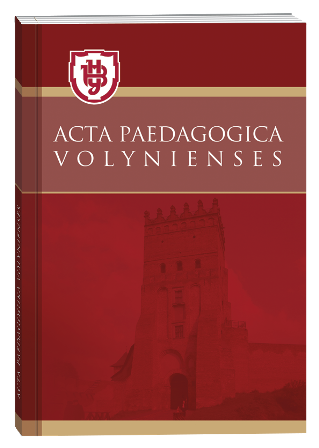DOMINANTS OF PROFESSIONALISM OF PEDAGOGICAL ACTIVITY OF PRESCHOOL INSTITUTION EDUCATOR
DOI:
https://doi.org/10.32782/apv/2021.4.1Keywords:
professionalism, pedagogical activity of the preschool institution educator, knowledge, communication, value attitude, valuesAbstract
The purpose of the article is to consider issues of professionalism of the preschool institution educator’s pedagogical activity in the axiological aspect; based on the generalization of scientific positions of different authors to clarify the essence of the concept “professionalism” in relation to the concepts of “pedagogical activity”, “pedagogical skill”, “personal and professional development”. Methodology. It is generalized that the professionalism of pedagogical activity should be considered from two sides: personal and active. Emphasis is placed on the fact that the value attitude is the highest level of the subject’s attitude to the professionalism of pedagogical activity. It is found that the priority values for the preschool institution educator can be the professionalism of the activity, ways and means to achieve it. Scientific novelty. There was allocated the leading principles and conditions of achievement professionalism, in particular professionalism of communication of preschool institution educator with children, parents, colleagues. In the article we focus on the issue of allocation in the structure of professionalism of pedagogical activity of three components, such as: professionalism of knowledge; professionalism of communication; professionalism of self-improvement, which provides dynamism, development of a holistic system “professionalism of the teacher” through right self-assessment and prompt overcoming of shortcomings and gaps. Conclusions. In the process of professional growth and formation the most important thing for a modern teacher is to determine and establish for himself the priority of the existence of absolute values. Thus, we have generalized that the professionalism of pedagogical activity of the preschool institution educator is a complex, multistructural, dynamic concept. The main components of the professionalism of the preschool institution educator are the professionalism of knowledge, communication, work. The essential characteristics of the value attitude to the professionalism of the educator are his reliance on the principles of humane pedagogy, compliance with the norms of pedagogical ethics, high level of pedagogical skills.
References
Пріма Р.М. Формування професійної мобільності майбутнього вчителя початкових класів: теорія і практика : монографія. Дніпропетровськ : ІМА-прес, 2009. 367 с.
Крижко В.В. Антологія аксіологічної парадигми управління освітою : навч. посібник. К. : Освіта України, 2005. 440 с.
Кулюткин Ю.Н. Ценностные ориентиры и когнитивные структуры в деятельности учителя. Самара, 2002. 400 с.
Кузьмина Н.В. Предмет акмеологии : 2-е изд, испр., доп. СПб. : Политехника, 2002. 189 с.
Леонтьев А.Н. Деятельность. Сознание. Личность. М., 1975. 181 с.
Мельник І.М. Професійне становлення майбутнього педагога: змістова сутність. Педагогіка формування творчої особистості у вищій і загальноосвітній школах : зб. наук. праць. Вип. 43 (96). Запоріжжя : Класичний університет, 2015. С. 218–223.
Бистрюкова А.Н. Формування готовності до професійного саморозвитку майбутніх учителів початкових класів засобами проєктної технології : автореф. дис. … канд пед. наук : 13.00.04. Ялта, 2009. 20 с.
Деркач А.А. Акмеологические основы развития профессионала. М. ; Воронеж : НПО «Модек», 2004. 752 с.
Архипова С.П. Становлення професіоналізму соціальних працівників з акмеологічних позицій. Акмеологія в Україні. Теорія і практика. № 1. 2010. С. 50–59.
Маркова А.К. Психология профессионализма. М. :Знание, 1996. 304 с.
Гузій Н.В. Педагогічний професіоналізм: історико-методологічні та теоретичні аспекти : монографія. К. : НПУ ім. М.П. Драгоманова, 2004. 243 с.
Кузьмина Н.В. Профессионализм личности преподавателя М. : АПН, 1990. 348 с.







